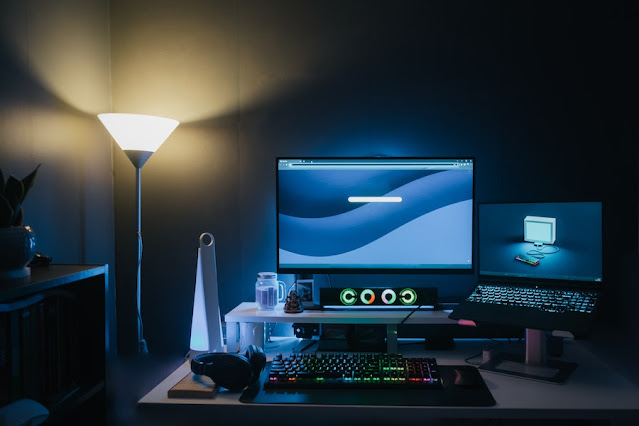We often overlook the impact of blue light from our digital devices on our sleep patterns and overall health. With the way technology has become an integral part of everyday life, reducing the time spent looking at phones, televisions, and laptops is a tough task for most people. Yet these are sources of blue-light exposure that can have serious consequences for your sleep quality.
So if you're having difficulty sleeping or just want to learn more about how to protect yourself against blue light’s effects on your body’s clock, keep reading - this blog post will explain what blue light is, how it affects your sleep, and some practical solutions that you can start using today.
 |
How Blue Light Affect Your Sleep and What You Can Do About It image from pexels.com |
What is blue light and how does it affect your sleep
Blue light is a type of visible light with a short wavelength, emitting high-energy rays that can affect our sleep patterns. In today's digital world, our exposure to blue light has increased significantly with the use of electronic devices. It disrupts the natural sleep cycle by suppressing the production of melatonin, a hormone that regulates sleep. This leads to difficulties in falling and staying asleep at night, affecting our overall health and productivity. Research shows that avoiding blue light exposure two to three hours before bedtime can help improve the quality and quantity of sleep. And luckily, with the invention of a light-blocking sleep mask, or even a pair of blue light-blocking glasses, it is now easier than ever to reduce our exposure to this troublesome light. By making small changes to our daily routines, such as using warm LED lighting or installing blue light filters on electronic devices, we can ensure a better night's sleep and a healthier lifestyle.
The dangers of blue light exposure before bedtime
In our modern age, screens have become a ubiquitous fixture in our daily lives. Whether it's a phone, tablet, or laptop, most of us spend hours staring at screens each day. However, what many of us don't realize is the potential danger of blue light exposure that these screens emit, especially before bedtime. Blue light, a type of high-energy visible (HEV) light, can disrupt our circadian rhythm, making it harder to fall asleep and leading to a poorer quality of sleep. Chronic exposure to blue light has also been linked to other health problems such as eye strain, headaches, and even macular degeneration. As we continue to rely on screens for work, entertainment, and communication, it's important to be aware of the potential dangers of blue light and take steps to protect our health, such as using blue light-blocking filters and reducing screen time before bedtime.
How to limit your exposure to blue light before bedtime
While it has certainly made our world more vibrant and easy to access, it can also disrupt our sleep at night. Our eyes are particularly sensitive to blue light, and exposure to it before bedtime can interfere with our body's natural production of melatonin - the hormone that regulates our sleep-wake cycle. To limit your exposure to blue light before bed, try using screens with a night mode, which will reduce the blue light emissions. You can also purchase blue light-blocking glasses, which are specifically designed to filter out harmful rays. Lastly, consider putting away your screens at least an hour before bedtime to give your brain a chance to wind down, and read a book or engage in relaxing activities instead. By taking these simple steps, you can ensure a more restful night's sleep and better overall health.
Tips on improving sleep quality by removing blue light sources from your bedroom
Studies have shown that blue light suppresses the production of melatonin, a hormone that regulates sleep-wake cycles. The good news is that you can improve your sleep quality by removing blue light sources from your bedroom. Try swapping out your phone for an old-fashioned alarm clock, investing in curtains that block out external light, or even purchasing blue light-blocking glasses. With these simple changes, you'll be on your way to a more restful and rejuvenating night's sleep.
The benefits of using a computer filter or program to reduce the amount of blue light emitted
Did you know that the blue light emitted by these screens can have harmful effects on our eyes and sleep patterns? That's where computer filters or programs come into play. By reducing the amount of blue light emitted from your screen, these filters can help prevent eye strain, and headaches, and even improve your quality of sleep. It's a small adjustment that can make a big difference in your overall well-being, especially if you're someone who spends a lot of time in front of a computer or other electronic device. So why not give it a try? Your eyes (and maybe even your sleep) will thank you!
Wearable tech options that can help reduce your blue light exposure
In a society where technology has become an integral part of our daily routine, it's important to acknowledge the potentially harmful effects it can have on our health, particularly when it comes to blue light exposure from electronic devices. Fortunately, there are various wearable tech options available that can help reduce blue light exposure and promote better sleep. From blue light-blocking glasses to smartwatches with built-in blue light filters, these devices allow you to stay connected without compromising your health. So, whether you're looking for a solution for yourself or a loved one, it's essential to be aware of the different options out there and invest in a wearable tech device that prioritizes your well-being.
The fact is that blue light emits artificial energy during the evenings and alters our circadian rhythms, making it difficult to drift off into a deep sleep. To reduce the negative impacts of blue light on our overall health and well-being, it is imperative for us to limit our exposure to screens late in the evening as well as ensure we are using blue-light-reducing screens by utilizing a computer filter or program such as f.lux. Additionally, investing in wearable tech options such as glasses or masks that can further reduce your exposure's potential disruptive effects can be great investments for those wanting to maximize their sleeping hours and lead healthier lives. It is important to note that managing your blue light does not have to be costly. Removing any electronic devices from your bedroom, closing blinds properly, utilizing natural lighting sources with dimmers, or drawing curtains throughout the day during hours you choose to stay up later at night could all be helpful solutions to getting a better night's rest. However, it will also mitigate your risk of suffering from various long-term medical maladies such as obesity or diabetes due to disrupted sleep habits caused by high levels of blue light exposure late at night.
























Post a Comment
Thank you for visiting my blog!~ I would love to hear your thoughts :)
Your comments are always welcome and appreciated :)
Good Times!~